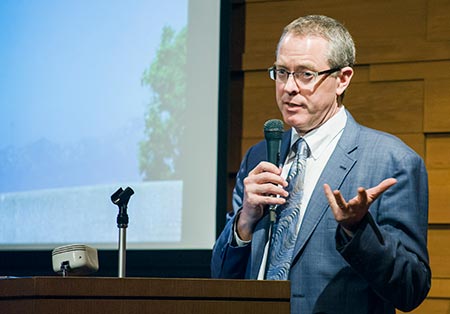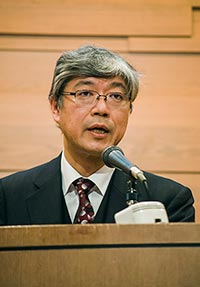This event now concluded. Report available here.
- Date: Friday, December 12, 2014, 1:00-5:30 pm
- Venue: Iwasaki Koyata Memorial Hall, International House of Japan
- Organizers: International House of Japan, Shibusawa Eiichi Memorial Foundation, Suntory Foundation
- Languages: Japanese/English (with simultaneous interpretation)
- Admission: Free
- Seating: 150 (reservations required, first-come-first served basis)
The year 2014 is the centennial of World War I. The war began with a shot in Sarajevo that echoed for over four years, involving not only Europe but many parts of the world. The war fundamentally altered the structure of the international society that had been in place since the 19th century and created the modern world beginning in the 20th century. Even after one hundred years, modern global interaction faces many challenges. Current themes such as the rise of China and disturbances in Crimea and Ukraine are not unlike those occurring in conjunction with the outbreak of World War I. Is there a need for a renewed understanding of the modern world?
| Keynote speakers: | David Welch, University of Waterloo |
| Nakanishi Hiroshi, Kyoto University | |
| Panelists: | Inoue Toshikazu, Gakushuin University |
| Iwama Yoko, GRIPS | |
| Hosoya Yuichi, Keio University | |
| Chair and Discussant: | Iokibe Makoto, Kumamoto Municipal University |
Report
Keynote addresses of 40 minutes each were delivered, followed by 15-minute presentations by panelists and discussions among all speakers. Finally, the moderator wrapped up the program with concluding remarks. The following is a summary of the main points raised.
◆Keynote Speech 1: Why World War I Still Matters
David A. Welch, Professor, University of Waterloo
Historian and international political scientist David Welch examined the causes and results of World War I, pointing to the significance of its lessons for today’s international society, particularly in view of the current situation in East Asia.
 Factors thought to have triggered World War I include poor leadership, including weak decision-making, among European leaders in 1914 and their lack of information, as well as the rise of democracy in Serbia and the rapid development of Russia, which Austria-Hungary and Germany felt to be threats; these factors, Welch said, made conflict inevitable. Many people expected the war to break out in France, so they were surprised when it actually erupted in the Balkans. This, Welch noted, suggests that war can be triggered in any number of places and for many reasons. Despite the fact that fighting began as a result of Austrian pressure on Serbia, once the war broke out the parties escalated their commitment, even when the cause of their action was lost, resulting in an unprecedented catastrophe. He explained that most people at the time did not think the war would last so long and become so massive.
Factors thought to have triggered World War I include poor leadership, including weak decision-making, among European leaders in 1914 and their lack of information, as well as the rise of democracy in Serbia and the rapid development of Russia, which Austria-Hungary and Germany felt to be threats; these factors, Welch said, made conflict inevitable. Many people expected the war to break out in France, so they were surprised when it actually erupted in the Balkans. This, Welch noted, suggests that war can be triggered in any number of places and for many reasons. Despite the fact that fighting began as a result of Austrian pressure on Serbia, once the war broke out the parties escalated their commitment, even when the cause of their action was lost, resulting in an unprecedented catastrophe. He explained that most people at the time did not think the war would last so long and become so massive.
Rising tensions in Japan-China and US-China relations today are raising fears of open conflict in East Asia. Welch said that while there are differences between Europe in 1914 and East Asia today, there are also similarities, such as the fact that many flashpoints exist, including the Korean Peninsula, East China Sea, and South China Sea. Given the current political and military climate in the United States and China, he said that a dispute could erupt at any time. People have learned that war is costly, both financially and in terms of human lives, and causes inflation. There is hope, he concluded, that given the fear many people have of nuclear weapons—which Europe did not have in 1914—they will make every effort to avoid a military confrontation.
◆Keynote Speech 2: Engraving on History: The First World War in the Long Twentieth Century
Nakanishi Hiroshi, Professor, Kyoto University
International political scientist Nakanishi Hiroshi noted that historical research into World War I has focused too narrowly on events immediately prior to and following 1914. He highlighted the importance of reexamining the war’s root causes and the factors that could have changed the course of events from a longer time frame to make a proper assessment of the war and to gain a fuller understanding of human, particularly political, history.
 Nakanishi commented that, in spite of the vast amount of research conducted over many years into World War I, no consensus has emerged regarding its causes and significance. Attention has been too narrowly focused, he said, on analyzing the events in Europe between June and August 1914. Gaining a fuller picture of the war requires viewing it from multiple temporal and spatial vantage points.
Nakanishi commented that, in spite of the vast amount of research conducted over many years into World War I, no consensus has emerged regarding its causes and significance. Attention has been too narrowly focused, he said, on analyzing the events in Europe between June and August 1914. Gaining a fuller picture of the war requires viewing it from multiple temporal and spatial vantage points.
He noted that the historical divide between the nineteenth and the twentieth century lies well before World War I and that the conflict was but one of the biggest consequences of this fault line. It was in 1890 that Germany embarked on an expansionist foreign policy following the resignation of Chancellor Otto von Bismarck and that the decision was taken to build the Trans-Siberian Railway—two events with global political consequences. Thus 1890 can effectively be viewed as the start of the twentieth century, Nakanishi said. While these changes are not directly related to the war in Europe, they are nonetheless linked, as political developments, rebellions, and civil wars in places around the world coalesced into the Great War.
Cataclysmic political changes were already emerging on a global scale prior to World War I, he said, so in analyzing the causes of the war there is a need to consider the balance of power not just in Europe but also worldwide. Peacekeeping mechanisms based on the traditional balance of power in Europe had already become dysfunctional by 1914, but many European powers failed to recognize that they were no longer capable of resolving the world’s major political issues on their own but required a more global approach. The failure of many leaders to perceive these structural changes, he said, lies behind the immediate causes of World War I.
◆Presentations by Panelists and Summary

Iwama Yoko, professor at the National Graduate Institute for Policy Studies, was the first panelist to make a presentation. Raising questions about the view that only European factors need be considered in elucidating the continent’s history, she agreed with Nakanishi that interaction with Asia and Africa also played a prominent political role by the turn of the century. As one example, she cited the Anglo-Japanese Alliance, which Britain used as a way of checking Russia’s southward expansion at a time when the hegemonic position of the British Empire was beginning to wane. Following Japan’s victory in the Russo-Japanese War, though, many countries aligned with the British Empire, including the United States, Australia, and New Zealand, began seeing Japan’s expansion in the Far East as a threat. World War I, she added, represented a breakdown in the process by which the Pax Britannica could have made a more peaceful retreat.
While cautioning against the attempt to draw lessons from World War I without regard to historical context, Hosoya Yuichi, professor at Keio University, nonetheless drew attention to the similarities to the current situation in East Asia. As factors that led to the war, he pointed to the overly optimistic assessments made by each country and their adoption of self-serving defense strategies, which left them unprepared to deal with any unexpected turn of events. He also pointed to the two Balkan crises that were resolved through European conciliation, prompting leaders to take thoughtless military action out of a misplaced faith that crises can be averted. Hosoya identified three elements necessary to maintain international order—balance of power, cooperation, and sense of community—which were all missing in Europe at the time. These features of prewar Europe have a close resemblance, he noted, to modern-day East Asia.
Inoue Toshikazu, president and rector of Gakushuin University, spoke on a wide range of positive and negative consequences of World War I for Japan. Inoue said that the outbreak of World War I was regarded in Japan as an upheaval in Europe, and many failed to recognize the vast changes it would bring to Japanese society. Among these were the promotion of a two-party system, the emergence of a mass consumption society, and a policy of international cooperation. The impact of these changes eventually led to the Manchurian Incident and the Second Sino-Japanese War.
Iokibe Makoto, chancellor of the Prefectural University of Kumamoto, who served as moderator of the panel discussion, noted that one of the lessons of World War I is that a balance of power is not a guarantee of peace; peace is achieved, he said, only when the party in a superior position exercises restraint. As examples, he cited Bismarck’s offer to host the Berlin Conference in the wake of the Franco-Prussian War and the US containment of the Soviet Union during the Cold War when the United States enjoyed a substantial advantage, encouraging self-restraint in Soviet behavior as well. These are “big lessons,” Iokibe said, that must be brought home to China—by the United States, Japan, and other countries—at a time when it is seeking to change the status quo in the surrounding seas through the use of force.